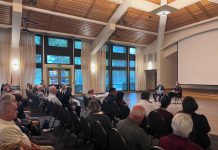There are plenty of reasons for the public hearings state
legislators often stage in various parts of California.
There are plenty of reasons for the public hearings state legislators often stage in various parts of California.
The reason most suspect – grandstanding to impress constituents – is certainly one. But hearings on prospective new laws also give the public and affected persons of all kinds a chance to make lawmakers aware of the sometimes unintended consequences of what they are about to do.
For when legislators pass laws in the dead of night, without so much as a press release to warn anyone about what’s coming, they can do a lot harm. Merely getting elected to the Legislature or some other office has never suddenly made anyone omniscient, despite what some of the elected may believe about themselves.
And yet, so-called “stealth” laws passed quickly before anyone has an opportunity to object or even to say anything about them, get through every year. This often happens on the last day of a legislative session, when provisions unrelated to the original stated purpose of a bill can be inserted and passed.
It also occurs almost every year on the night lawmakers pass the annual budget, something that’s almost always accomplished in the early morning hours when virtually no one is looking.
Does anybody seriously think Assembly Bill 114, pushed through as one of more than a dozen “trailer” laws that enabled this year’s rare on-time budget, was anything more than a bow by Democratic politicians to the California Teachers Association, the single union that gives them the most support?
This measure prohibits the layoff of any more school teachers during the coming year. It means that even if a shortfall in state revenues occurs at mid-year, and school budgets are reduced drastically again, they still can’t lay off any teaching staff. Yes, schools can cut time off the academic year if tax dollars fall short of budgetary assumptions.
But this law requires that even those reductions not come unless union locals agree to them. How likely is that? So schools could go broke because of their very limited options for handling shortfalls, a situation that would not have passed muster with public opinion had this law gotten open hearings.
Then there was Senate Bill 89, another stealth budget trailer passed just hours before the final financial vote. This one eliminates $130 million in vehicle license fee pass-throughs from the state to local governments.
Two-thirds of that money in the last fiscal year went to pay for core police and fire services. About $87 million will be cut from police and fire and another $43 million from other local services under this secret law and a smaller companion measure.
This will hit hardest at newly incorporated cities, which have little or no reserves and depended on that money for some of their most basic functions. In Riverside County, officials say four cities established in the last five years – Jurupa Valley, Eastvale, Wildomar and Menifee – could be forced to disincorporate, losing independence and reverting to simply being county territory. Without a fix, at the very least these new municipalities will have to lay off scores of employees, including everything from building inspectors to city clerks.
While Gov. Jerry Brown said he had no idea the measure would impact heaviest in the Republican stronghold that elected his most solid opponents in this year’s budget battle, now he knows.
If legislators were to pass a revision helping the new cities, Brown’s willingness to sign or veto it would be a pretty good sign of whether this measure was really designed chiefly as political payback, which some in Riverside County suspect.
Again, it’s virtually certain this measure would not have passed had it seen any daylight before sneaking through the Legislature.
Of course, hardball politics often sees electoral winners reward backers and punish enemies. But rarely as obviously as these two last-moment measures appear to do for the Democrats now controlling every part of state government.
When emergencies happen, an effort to require ample public notice of prospective laws before they pass might sometimes make no sense.
At the same time, it’s unfair, unseemly and irresponsible for the majority to use its sheer numbers to make decisions which so plainly smack of machine politics. And yet, it’s doubtful those behind these unjustified laws will ever pay a price for them.
Email Thomas Elias at td*****@*ol.com. His book, “The Burzynski Breakthrough: The Most Promising Cancer Treatment and the Government’s Campaign to Squelch It,” is now available in a soft cover fourth edition. For more Elias columns, visit www.californiafocus.net.







